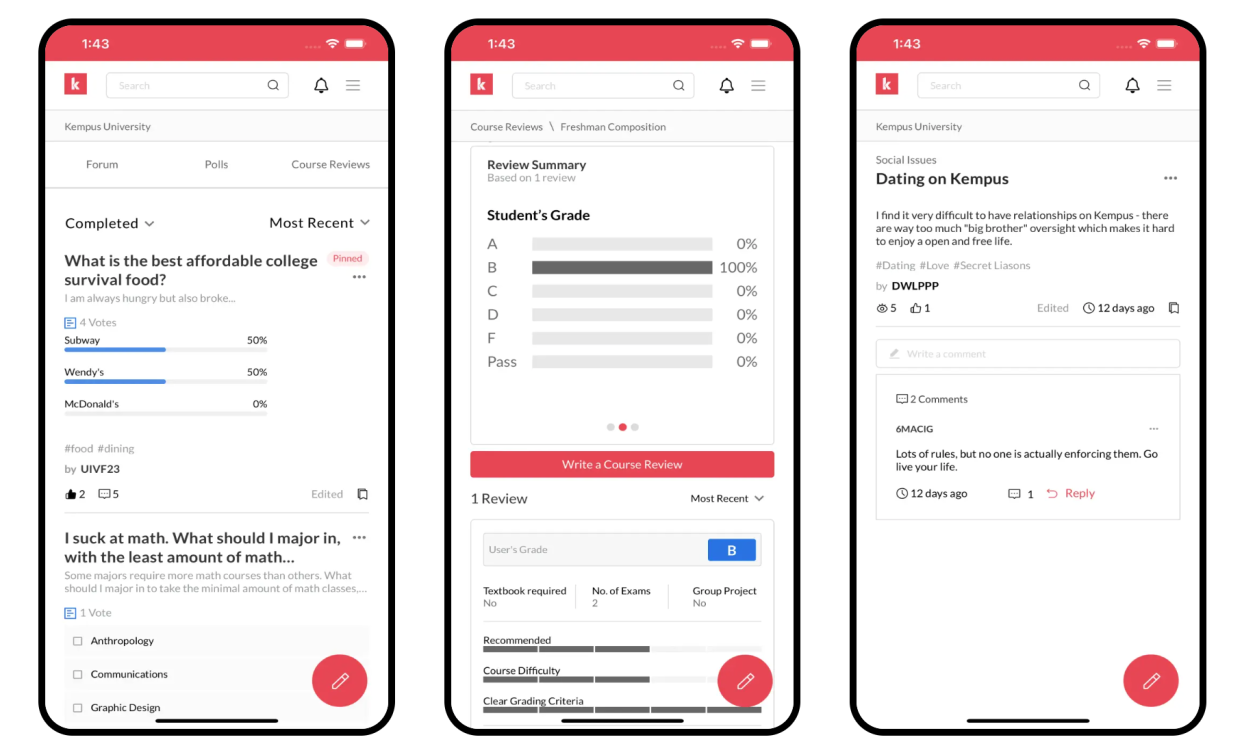Kempus wants to be the ultimate app for sharing college hacks

Remember poring over reviews on Rate My Professors to find out which prof is good-looking and who gives easy As? The professor and class ratings site is one of the few web 1.0 sites that are still well and alive today. When the portal was acquired by news streaming service Chedder in 2018, it boasted a monthly user base of 6 million.
Its long-lasting relevance impressed Jae Lee, a South Korean serial entrepreneur educated in the U.S. and living in Singapore, but the site is nowhere near perfection. Identities aren't verified, for instance, so there's no way to vet the validity of reviews. After all, students see it more as an "entertaining" site rather than something serious that they base their course decisions on, Lee suggests in an interview.
Nonetheless, the popularity of ratemyprofessors.com signals students' need for a place where they can help each other out with their college experience. Lee and his co-founder Danny Woo thus set out to build Kempus, an anonymous online community for U.S. college students.
Specifically, Kempus aims to create a reservoir of knowledge to help students reach their ultimate goal, in Lee's words, "the upstream of getting a college degree." That knowledge, or what the founder calls "a unique dataset within higher education," can range from professor ratings to tips for buying second-hand textbooks, housing reviews and how to get counseling on campus.
"We are democratizing the level of access to information, which starts with course reviews," says Lee.
Incorporated in August 2022, Kempus recently raised $3 million in a seed round from Bithumb Korea, a major cryptocurrency exchange in South Korea, though the founder says the company has no plans to associate itself with cryptocurrencies.
The reason for taking money from Bithumb, according to Lee, is that Kempus is fundamentally a data business, so "we chose to pitch our idea to a seed investor who had prior investments relevant to a data-driven business, including but not limited to blockchain, under their portfolio."
Self-governing
A flurry of reports has shown that adolescents are especially prone to social media harm. While ambitious startups like Fizz are touting "safe and private" social networks for college students, sparking investor interest in the "next Facebook," Kempus positions itself more as a "community" that harnesses the experiences and knowledge of students.
Users are anonymous, but their identities are verified through their school emails and they are only able to join their own college communities. To foster a safe environment, Kempus created a self-governing mechanism through which students can flag bad actors. "We're not these mega social media where we can hire thousands of people in the Philippines to moderate content, so the first layer [of filtering] is the community," says Lee.
The second layer is Kempus itself, which rewards students with points for their content contribution. In doing so, the company aims to become the facilitator rather than the moderator or censor.
To attract early users, Kempus is reaching out to student associations and faculty members across universities. It launched its MVP (minimum viable product) only in late January, so it's still too early to say whether it has found its product-market fit. While course reviews sound like a niche, Lee reckons a narrow focus is exactly the startup's strategic advantage.
"There have been multiple jabs taken at solving the problem of higher education as a whole... But I think there are multiple aspects, multiple categories that are so deeply rooted in society and the human race that is a very difficult problem to solve because it could be related to politics," he argues. "We're not here to solve higher education as a problem as a whole. We're trying to focus on the bottom up."

